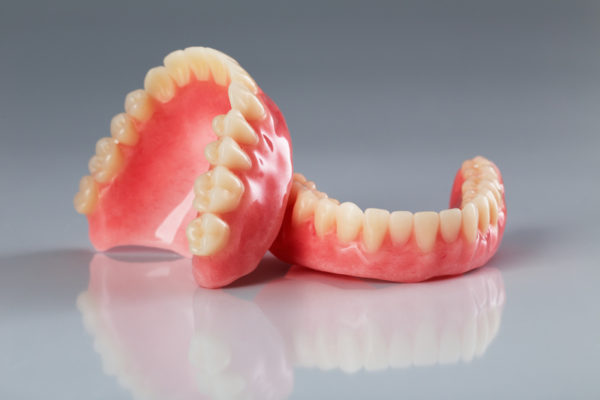

In the past, it wasn’t uncommon for relatively young patients to end up with dentures. Poor oral hygiene awareness, as well as almost non-existent fluoride or sealant use, meant a higher rate of denture use among a younger population.
Luckily, a better understanding of preventive dentistry and improved use of fluoride and other preventive measures have lead to a long-term decline in the number of denture users. However, it still remains a popular tooth replacement options for individuals due to its convenience for individuals missing most or all the teeth in their arch and also because of its lower initial costs.
Unfortunately, many patients are unaware that dentures can take a lofty toll on your oral health. If you’re trying to save money by opting for full dentures, the long-term costs of restoring your smile to it’s best health can eventually make this an expensive treatment option.
How Much Do Dentures Cost?
While dentures may seem like a financially sound decision at the start, the long-term health impact of this condition can make it a greater financial investment than most patients realize. Even more importantly, prolonged denture use can cost you a healthy, fully functional smile.
When it comes to your oral wellbeing, here’s the real cost of dentures:
Diminished Bone Structure
The jawbone is the unsung hero of your smile. In healthy dentitions, the bone is stimulated by roots of your teeth. When the roots are missing because of prolonged tooth loss, the bone weakens and demineralizes through the process of resorption. While this process may start where the tooth is missing, resorption quickly affects neighboring bone tissue and ultimately leads to additional tooth loss.
Although dentures can replace missing teeth, they are removable. As a result, this restoration option fails to provide much-needed stimulation that can prevent a worsening of resorption. In the long-run, denture-wearing patients must undergo some form of bone grafting in order to return their jaw to some semblance of health.
Gum Recession & Disease
Bone deterioration isn’t the only consequence of prolonged denture use. Gum recession is another serious side effect produced when dentures, particularly partial dentures, no longer fit correctly. Gum recession “pulls” gum tissue away from teeth, leaving teeth exposed and vulnerable to infection and gum disease. As a result, some patients may need to undergo gum disease therapy as well as gum grafting in order to return their smiles to health.
Changes to Facial Structure
Gum recession and bone resorption not only compromise the health of the dentition – dentures also result in serious changes to your overall facial structure. As the bone continues to deteriorate, it loses its shape and causes the chin to appear like it’s sagging. In younger patients, this can cause the look of premature aging.
Changing facial structure also limits the effectiveness of your denture. When your removable oral appliance no longer fits correctly, patients are at an increased risk of damaging gum tissue and further weakening bone tissue. In order to put an end to this cycle, your full or partial dentures will need to be realigned or replaced.
Increased Risk of Sores
Poorly fitting dentures are key contributor to a number of oral health problems. One especially common issue facing denture wearers is sores. Caused when new or poor fitting dentures are being used, these sores can make it difficult to eat or chew. While older dentures may be realigned or readjusted so they fit better, it can take time for patients to get used to wearing their new appliance.
Risk of Infection
One of the most significant oral health risks brought about by dentures is the threat of infection. While dentures may seem fairly solid, the acrylic used to make the gum portion of your appliance is actually rather porous. Even with proper and daily care, bacteria can still grow on your denture. This then introduces bacteria to an already vulnerable dentition.
An especially common infection is stomatitis, also known as denture thrush.This condition is caused by a fungus known as candidiasis. While not transmissible like a virus, the fungus affects denture wearers who may have a hard time keeping their mouths and denture clean. Denture stomatitis is best identified by the appearance of a large, red, sore patch on the tissue immediately beneath the denture. In order to treat the condition, it’s critical that patients practice good oral hygiene and keep their dentures as clean as possible. Medication may also be recommended.
Avoid the Hassle of Dentures Today
Your oral well being is priceless – why compromise your smile’s health with a treatment that does more harm than good? At St. Louis County Dental, Dr. Brace and his associates are committed to helping patients find lasting tooth replacement options that improve their oral and overall health rather than risk it. If you’re a first-time denture wearer or exploring treatment options for a loved one, we encourage you to call our St. Louis dentist today.
